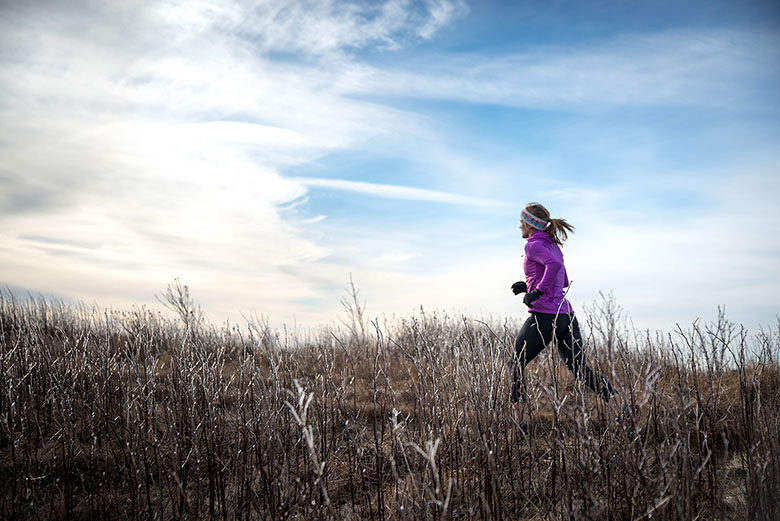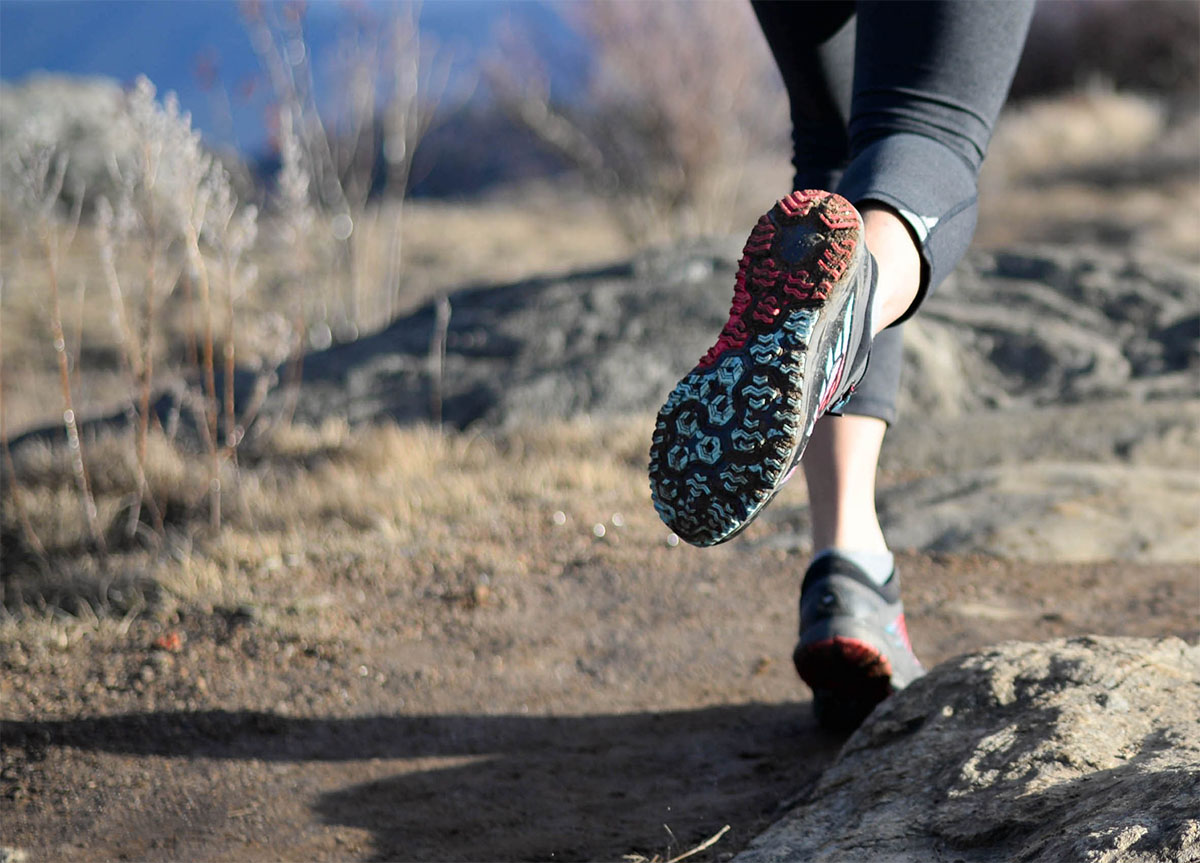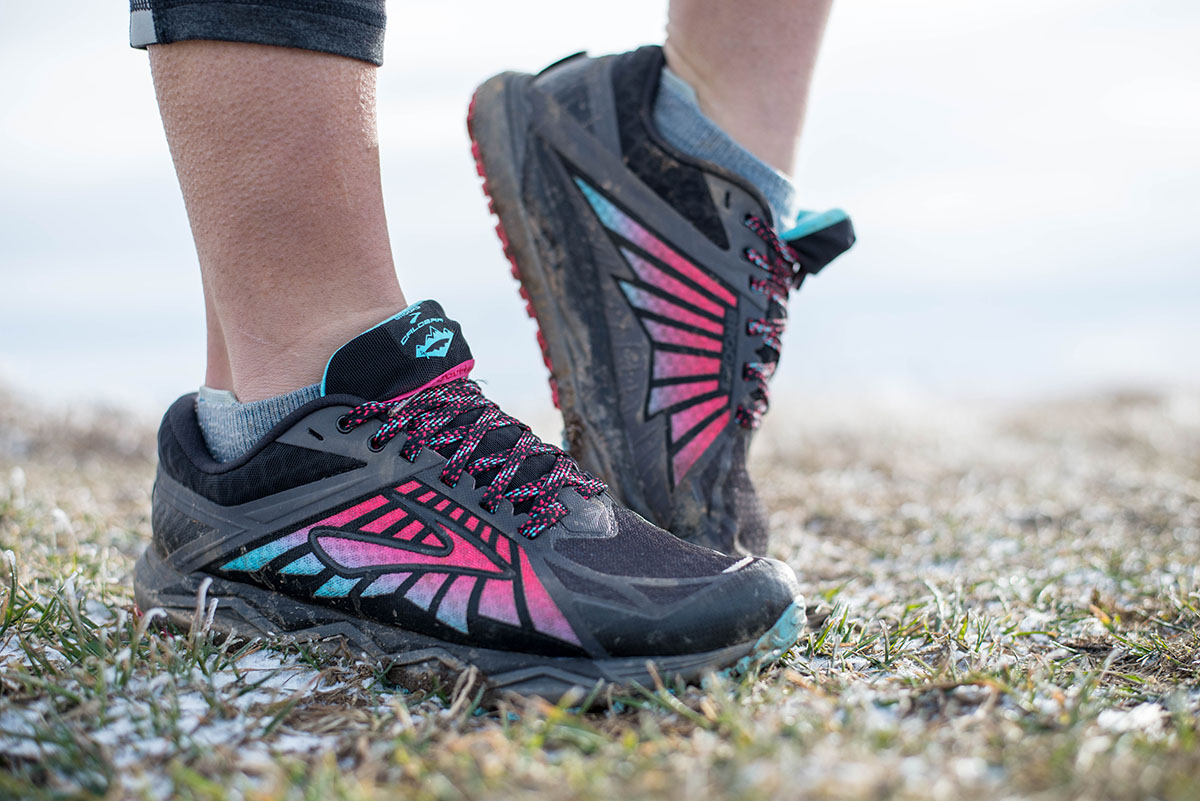

In December of 2016, Brooks released a brand new shoe—the Caldera—filling a much-needed hole in their trail running lineup. The timing was perfect: in January of 2017, I completed training for and ran my first ultramarathon. During testing I found that the Caldera is an accomplished long distance trail runner: it’s light and responsive enough for big mileage, yet offers enough cushioning and stability to keep your feet feeling balanced and comfortable on most types of terrain. Below are my thoughts on the Caldera’s traction, cushioning, stability, durability, fit, and more. To see how the Brooks Caldera stacks up, see our comparison table and article on the best trail-running shoes.
Training during the winter in Western North Carolina, I test drove my pair of Brooks Calderas on trails layered in soggy leaves, over wet rock outcroppings, and through obstacle courses of slippery roots. On every type of terrain, the Caldera held on firmly. The sticky rubber that makes up the outsole clings to rocky surfaces, and the 3-3.5-millimeter multidirectional lugs offer a large surface area to dig into loose and slippery terrain and provide superb braking power. The traction of these shoes was so high, in fact, that the stickiness caught me off guard at times while running downhill on challenging sections.
The Caldera’s midsole is made of Brooks trademark BioMoGo DNA cushioning—a wonderful combination of plush and firm. Despite the lack of a rock plate, I seldom felt rocks through the sole. The Caldera’s midsole has a 4-millimeter heel-to-toe drop, allowing the foot to strike naturally. And with a relatively tall stack height of 25 millimeters at the heel—the same as the heavily cushioned Altra Lone Peak 3.0—the Caldera has the type of cushioning and bounce more often found in a road shoe.
That being said, the Caldera is on the lighter side of the trail shoe spectrum (a women's 8 weighs 9 ounces) and I felt as though I still had great interaction with the trail despite the hefty amount of cushioning. Compared with a max cushioned shoe like the Hoka One One Challenger ATR 3, the Caldera retains better feel underfoot. Training for a 50K, I was running longer distances than ever, and the shoes proved to have that just-right balance of comfort and performance.

The thick cushioning of the Caldera is further enhanced by a notably wide footbed. This broad base allows the shoe to provide a great deal of stability without adding the weight of TPU or other stabilizing materials to the midsole. At times, however, I wondered if this broad base, or perhaps the thick cushioning, tripped me up. I noticed that I lightly rolled my ankle more than usual while running in the Calderas. If you consistently run technical trails, a more supportive shoe like the La Sportiva Bushido or Brooks Cascadia 12 is worth considering.
Although the Caldera does not feature Gore-Tex waterproofing, the double-layer mesh toe box and gusseted tongue make the shoe nearly impenetrable. Even on runs in the rain my feet stayed dry, although the fabric will give in eventually. I was very impressed by how the upper material resists water and mud yet wicks moisture away from the inside and allows my foot to breathe. Additionally, the mesh is very lightweight: these shoes will not absorb water and become heavy, and will dry quickly when wet.

With the new Caldera, Brooks has made a lightweight shoe without sacrificing the tough build that a long distance shoe necessitates. The toe box is reinforced, stretchy, and does not strike me as the kind of fabric that will develop holes easily (I have a history of putting holes in running shoes above my big toe).
I do wonder how long the cushioning will stay bouncy and thick. Without a rock plate, once the cushioning starts to go, the shoe could immediately become uncomfortable to wear on rocky trails. Additionally, the shallow nature of the lugs causes me to wonder how long the tread will last. However, after putting in over 100 miles with the shoes, the traction and cushioning are as good as ever and I notice no significant signs of wear.
I have particularly wide feet, and the Caldera successfully accommodates them with a newly designed last that is snug in the midfoot and wide in the forefoot. The last design, along with the heel counter, seems to lock in the rear foot for great control and minimal movement. The double-layer mesh that makes up the forefoot upper is reinforced with a great deal of structure but still remains slightly stretchy to accommodate many foot types. However, there is so much room in the forefoot—even for my wide feet—that I would suspect the Caldera wouldn’t be the shoe of choice for runners with narrow feet. Despite the room for movement, I experienced no rubbing or hot spots. The shoe fits true to size.
We tested the women’s version, but Brooks also released a men’s Caldera that has the same design with different colorways. As with the women’s model, the verdict is the same: the Caldera is lightweight (9.9 ounces in a men’s size 9), offers excellent cushioning for distance running, and has a generous fit in the toe box.

| Shoe | Price | Category | Weight | Cushioning | Drop |
|---|---|---|---|---|---|
| Brooks Caldera | $140 | Easy trails/rugged trails | 18 oz. | Moderate | 4mm |
| Hoka One One Challenger ATR 3 | $130 | Easy trails/rugged trails | 15.8 oz. | Maximum | 5mm |
| Altra Lone Peak 3.0 | $120 | Easy trails/rugged trails | 16 oz. | Moderate/maximum | 0mm |
| New Balance Leadville v3 | $125 | Easy trails/rugged trails | 17.4 oz. | Moderate | 8mm |
| Brooks Cascadia 12 | $130 | Easy trails/rugged trails | 21 oz. | Moderate | 10mm |

Compared to Brooks’ other models, the Caldera is the standout ultramarathon shoe, balancing cushion, stability, and durability with responsiveness, flexibility, and weight. We prefer it to the very popular Brooks Cascadia 12, which weighs too much and lacks the fun feel of the Caldera. Even compared to its equal in weight and drop—the Brooks PureGrit—the Caldera offers greater heel stability and a sticky-rubber sole.
Among top long distance trail-running shoes, the Caldera stacks up well. It possesses similar traits as the Hoka One One Challenger ATR 3 but with 3 millimeters less cushioning. We prefer the Brooks in this case as a little less thickness yields an ideal combination of cushioning and interaction with the trail. The Altra Lone Peak 3.0 (see our in-depth review) is another strong long distance competitor that comes in a zero-drop design. Neither the Altra and Brooks are technically adept, but both have great traction and wide, comfortable fits. It’s a close call between them—in fact, they rank side-by-side in our article on the best trail-running shoes—but we think the Altra is a better value at $120. Provided you like a wide toe box and avoid super rough trails, you can’t go wrong with either shoe.
If you’re thinking about buying gear that we’ve reviewed on Switchback Travel, you can help support us in the process. Just click on any of the seller links above, and if you make a purchase, we receive a small percentage of the transaction. The cost of the product is the same to you but this helps us continue to test and write about outdoor gear. Thanks and we appreciate your support!
Depending on the seller, most products ship free in the United States on orders of $50 or more. International shipping availability and rates vary by seller. The pricing information on this page is updated hourly but we are not responsible for inaccuracies.